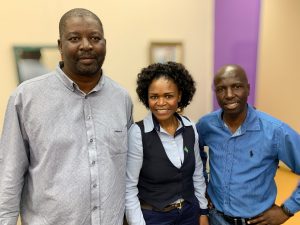Physics Education
Home » Faculties of Science » Departments » Physics » Research »
From Left: Mr Mpiriseni Khwanda, Dr Buyi Sondezi, and Mr Paul Molefe
Physics Education research has become critical with the advent of new curriculum in the school sector and the challenges it imposes on both the teachers and the learners. Furthermore the declining quality and competency of school leavers from science streams entering the higher education institutions demand added interventions and modelling for shaping the future of Physics in South Africa as well as achieving desired outputs in higher education sector.
The reported work from various sectors, in national and international conference proceedings and independent journals, including external examiner-ship for (MSc) and (PhD) thesis are motivational factors for furthering the research in Physics Education. It is when this field of Natural Science is well delivered from school level that we can experience a great change at higher level of education, in as far as the field of Science is concerned. Physics Education Group at the University of Johannesburg, APK Campus, constantly endeavours to put the interests of the learners and students first by seeking methods of improving through-puts and pass rates in Physical Science and Physics, respectively.
Currently, the group consists of 3 candidates who are actively involved in Physics Education.
Paul Molefe
Mr Molefe is a lecturer in the Department of Physics based at Auckland Park Campus (APK). He obtained his MSc (Physics) and BSc (Hons) in Physics from the former Rand Afrikaans University (RAU) and BSc in Education from Vista Soweto campus. His current research interest is in Physics Education, his main focus is student teachers educational belief, nature of science and teaching and learning of vectors in first year level. His work in this area has produced a number of Peer-Reviewed Conference papers and is regarded as one of the experts in dealing with students at the first year level. This stems from his passion of education and lecturing, added to his personal experience in teaching learners from a school level.
Mr. Molefe has coordinated a number of Physics in his line of work, and has and constantly give advises on teaching and learning Physics from high school level to university undergraduate level.
Email Address: pmolefe@uj.ac.za
Mphiriseni Khwanda
Mr Khwanda is a lecturer in the Department of Physics, based at Auckland Park Campus (APK). He obtained MSc in physics education at UNISA and BSc (Hons) in Physics from UNIVEN and Secondary teacher’s diploma at Venda College of Education. His current research interest is in Physics Education, where his main focus is interactive engagement during the teaching and learning of physics and students conceptual understanding of electricity. He has grown to be an expert in the area of electricity. He has established ways in which this SECTION of Physics can be delivered in such a manner that learners and students find it easy to follow and understand. He has conducted a number of workshops for teachers as he highlighted the successful approach that he has practiced for a while now. His work and contribution in Physics Education is recognized and appreciated mostly by all teachers he has workshopped and the learners he continually assist.
Email Address: mkhwanda@uj.ac.za
Dr Buyi Sondezi
Dr Sondezi is Senior Lecturer at the University of Johannesburg, Physics Department, APK Campus. She currently holds a PhD (Physics) obtained in Condensed Matter Physics, in the field of Experimental Physics of highly Correlated Matter. She is also doing research in Physics Education where she seeks for alternative methods of delivering this subject or course that has been perceived as difficult for most learners and students. In her search, Dr Sondezi highlights the importance of teaching from the known perspective, and gradually move to the unknown, which is what she says, helps students to understand better as they easily relate to the circumstances. In her teaching and research, she is in favor of INQUIRY BASED LEARNING, and lately stated that CONSTRUTIVISM approach is one of the option to consider as we seek for alternative methods. Her research is ongoing and has presented her findings in a number of conferences and also published in peer-reviewed conference proceedings.
Dr Sondezi still continues with her research in Low Temperature Physics, Physics of Highly Correlated Matter. For more on this, please visit MAGNETISM II webpage. For her contribution on Community Engagement activities, please go to that site as well. She mentors undergraduate students, in trying to help them achieve their goal. For more on this, please visit the relevant page.
Email Address: bmsondezi@uj.ac.za
In terms of the 4IR we came up with the following:
- E books & Computer Simulations: To bridge the resource shortage gap, and interactive teaching and learning. E-book helps us in class as we promptly direct students to relevant sections we are teaching on. This helps in interactions and simulations and accessing real world as we study some Physics concepts.
- WhatsApp Groups: For sharing ideas and asking questions. Students are able to interact on their own at any given time.
- Google Forms & Blackboard ULink (Institutional Platform for students-lecturer access): For pre and post instructional assessments and surveys. It helps us to get information to the class and use the results for interventions.
Collaborations with this group are more than welcome at any given time.
